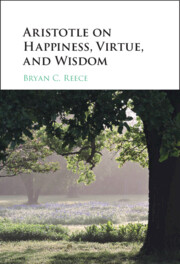3 results
Chapter 1 - From the Dilemmatic Problem to the Conjunctive Problem of Happiness
-
- Book:
- Aristotle on Happiness, Virtue, and Wisdom
- Published online:
- 15 June 2023
- Print publication:
- 29 June 2023, pp 1-30
-
- Chapter
- Export citation
Chapter 3 - Are There Two Kinds of Happiness?
-
- Book:
- Aristotle on Happiness, Virtue, and Wisdom
- Published online:
- 15 June 2023
- Print publication:
- 29 June 2023, pp 62-79
-
- Chapter
- Export citation

Aristotle on Happiness, Virtue, and Wisdom
-
- Published online:
- 15 June 2023
- Print publication:
- 29 June 2023

